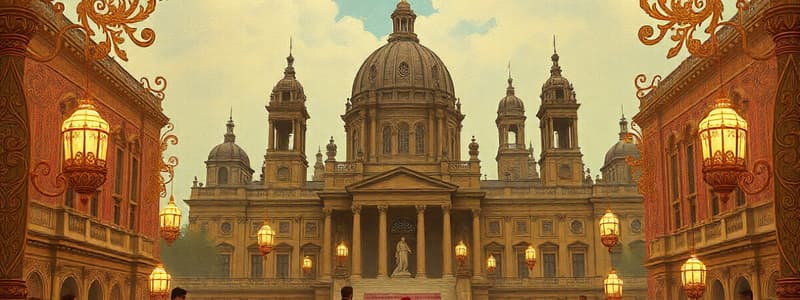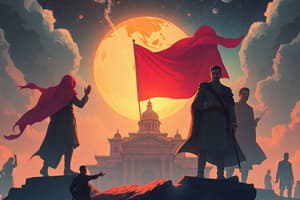Podcast
Questions and Answers
What does the quote by Winston S. Churchill imply about democracy?
What does the quote by Winston S. Churchill imply about democracy?
- Democracy is a perfect form of governance.
- Democracy is the ideal form of government.
- Democracy has flaws but is superior to other systems. (correct)
- Democracy is better than all other forms of government.
According to Abraham Lincoln, what are the three components that define democracy?
According to Abraham Lincoln, what are the three components that define democracy?
- Of the people, for the people, and by the people. (correct)
- Input, throughput, and output.
- Leadership, governance, and public interest.
- Elections, policies, and legislation.
In the context of Scharpf's legitimacy framework, what does 'throughput' refer to?
In the context of Scharpf's legitimacy framework, what does 'throughput' refer to?
- The initial input of ideas and demands from citizens.
- The effectiveness of the solutions implemented.
- The procedures and processes followed in governance. (correct)
- The electoral process and participation of the citizens.
What challenge does the discussion on 'output legitimacy' address?
What challenge does the discussion on 'output legitimacy' address?
What is suggested as the most effective means for rulers to act in the interest of the ruled?
What is suggested as the most effective means for rulers to act in the interest of the ruled?
What has emerged as a 'new normal' in the context of democracy in Europe?
What has emerged as a 'new normal' in the context of democracy in Europe?
Which of the following actions are often associated with authoritarian regimes?
Which of the following actions are often associated with authoritarian regimes?
What is one of the beliefs associated with right-wing populism?
What is one of the beliefs associated with right-wing populism?
Why do authoritarian rulers seek legitimization?
Why do authoritarian rulers seek legitimization?
How has the transformation of Eastern European countries been perceived?
How has the transformation of Eastern European countries been perceived?
What is a key principle of democracy regarding rulers?
What is a key principle of democracy regarding rulers?
According to Dahl, which of the following is NOT a characteristic of a democratic regime?
According to Dahl, which of the following is NOT a characteristic of a democratic regime?
Which aspect is part of Dahl's procedural definition of democracy?
Which aspect is part of Dahl's procedural definition of democracy?
Which theoretical approach emphasizes individual participation in democracy?
Which theoretical approach emphasizes individual participation in democracy?
What does the elitist theory suggest about political participation?
What does the elitist theory suggest about political participation?
What are the three key principles of liberal democracy?
What are the three key principles of liberal democracy?
What is considered a vital feature of democracy regarding information sources?
What is considered a vital feature of democracy regarding information sources?
What is a primary criticism of liberal democracy as discussed?
What is a primary criticism of liberal democracy as discussed?
Which of the following is NOT part of the classical theory of democracy?
Which of the following is NOT part of the classical theory of democracy?
In the context of political culture, how does social values impact politics?
In the context of political culture, how does social values impact politics?
What is meant by 'volonté générale' in the context of classical democracy?
What is meant by 'volonté générale' in the context of classical democracy?
What does the term 'militant democracy' refer to?
What does the term 'militant democracy' refer to?
Which of the following statements best describes a characteristic of non-Western political ideas?
Which of the following statements best describes a characteristic of non-Western political ideas?
What does the democratic method involve according to Schumpeter?
What does the democratic method involve according to Schumpeter?
What is one of the significant problems in democracy as mentioned in the content?
What is one of the significant problems in democracy as mentioned in the content?
What model of democracy involves the domination of the executive over the legislature?
What model of democracy involves the domination of the executive over the legislature?
How is democracy defined in terms of the consent of the governed?
How is democracy defined in terms of the consent of the governed?
Which type of democracy is characterized by public referenda?
Which type of democracy is characterized by public referenda?
In the context of democracy, what is a challenge presented by direct participatory democracy?
In the context of democracy, what is a challenge presented by direct participatory democracy?
What is one key difference between majoritarian and minority-led decision making in a democracy?
What is one key difference between majoritarian and minority-led decision making in a democracy?
What is meant by 'democratic deliberation' as a new direction in democracy?
What is meant by 'democratic deliberation' as a new direction in democracy?
What is one implication of moving from domestic to cosmopolitan democracy?
What is one implication of moving from domestic to cosmopolitan democracy?
What does the complex procedural definition of democracy, as per Giovanni Sartori, encompass?
What does the complex procedural definition of democracy, as per Giovanni Sartori, encompass?
Flashcards are hidden until you start studying
Study Notes
Democratic Regimes
- Democracy: A system of government where power rests with the people.
- Churchill's quote: Democracy, despite its flaws, is considered the best form of government compared to others that have been tried.
- Lincoln quote: Democracy is a system of government for the people, by the people, and of the people. This emphasizes the connection between the people and their government.
- Scharpf's Input, Throughput, Output model:
- Input: Elections are the primary source of legitimacy in democracies.
- Throughput: Law-making processes and institutional functions provide ongoing legitimacy.
- Output: Effective solutions are necessary to maintain legitimacy.
- Garner's definition: Democracy ensures that rulers act in the interest of the ruled. This involves:
- Government of the people: Wide participation and representation of all in governance.
- Accountability: Rulers are held accountable through procedures and checks and balances.
- Choice: Rulers are selected through elections by the people or their representatives.
- Dahl's Procedural definition: A regime is democratic if it has:
- Universal suffrage: Equal voting rights for all adults.
- Free and fair elections: Multiple parties, freedom from manipulation.
- Multiple political parties: Choice for citizens in a competitive environment.
- Diverse information sources: Freedom of the press and access to multiple perspectives.
Classical vs Elitist Theories
- Classical Theory: Focuses on individual participation and rule of the people.
- Individual freedom and equality: Emphasizes active civic engagement to shape political decisions.
- Volonté générale (common will): Decisions based on the collective good.
- Participatory & Representative democracy: Both direct and representative forms are encouraged.
- Elitist Theory: Focuses on representation by political elites.
- Political competition: Elites compete for power through elections.
- Apolitical individuals: Citizens participate in elections but leave political decisions to elites.
- Schumpeter's definition: Democracy is a process of choosing leaders through competitive elections.
Democratic Challenges
- Political equality vs. elites: Balancing the power of elites with the needs and rights of the people.
- Direct vs. representative democracy: Navigating the benefits and drawbacks of direct citizen participation versus elected representatives.
- Mass politics vs. specialized decisions: Balancing the will of the majority with complex decision making.
- Majoritarian decisions vs. minority rights: Ensuring the protection of minority groups within majority rule systems.
- Positive vs. negative freedom: Balancing the freedom of the individual from the state with the freedom to participate in society.
- Procedural vs. social justice: Addressing both fairness of process and equitable outcomes in a democracy.
New Directions
- Democratic deliberation: Moving from simply aggregating preferences to reasoned discussions and inclusion of citizens' voices.
- Cosmopolitan democracy: Exploring the potential for global governance and democratization.
- Illiberal democracies: The rise of democratic societies that prioritize nationalism and authoritarian methods over liberal values.
Authoritarian Regimes
- Authoritarianism: A system characterized by limited individual freedoms and strict control by the state.
- Coercion and power: Authoritarian regimes use coercion, threats, and terror to maintain power.
- Legitimacy: Authoritarian rulers often seek to legitimize their rule through various means.
- Hybridity: Some authoritarian regimes may hold elections but lack key democratic features.
- Acceptance: Authoritarian regimes can enjoy popular acceptance even with limited freedoms.
Populism and The Rise of Autocracy
- Populism: A political ideology that emphasizes the "pure people" against a corrupt elite.
- Right-wing populism: Often combines populist sentiments with nationalist and authoritarian beliefs.
- Nativism: Emphasis on national homogeneity and exclusion of outsiders.
- Authoritarianism: Strong belief in the need for strong leadership and the punishment of dissent.
Political Culture
- Habits and opinions: Shared beliefs and experiences that influence political views.
- Social values: Cultural norms and values shape political culture.
- Non-Western political ideas: The significance of diverse political systems and cultures beyond Western models.
Liberal Democracy
- Freedom, voice, and compromise: Core values of liberal democracy.
- Individual rights: Protection of individual freedoms and liberties.
- Electoral processes: Means for citizens to express their views and hold leaders accountable.
- Compromise: Electoral competition encourages governments to consider various perspectives.
Critiques of Liberal Democracy
- Veiled oppression: Argument that individual freedoms can oppress collective strengths.
- The "real people": Emphasis on collective needs rather than individual desires.
- Market access: Critique of democracies for prioritizing market forces over individual interests.
Militant Democracy
- Broad participation: Encourages widespread participation in political debate.
- Parliamentary threshold: Minimum vote requirements for parties to enter parliament.
- EU debate: Contentious discussions surrounding the balance of power and national sovereignty within the European Union.
Studying That Suits You
Use AI to generate personalized quizzes and flashcards to suit your learning preferences.




